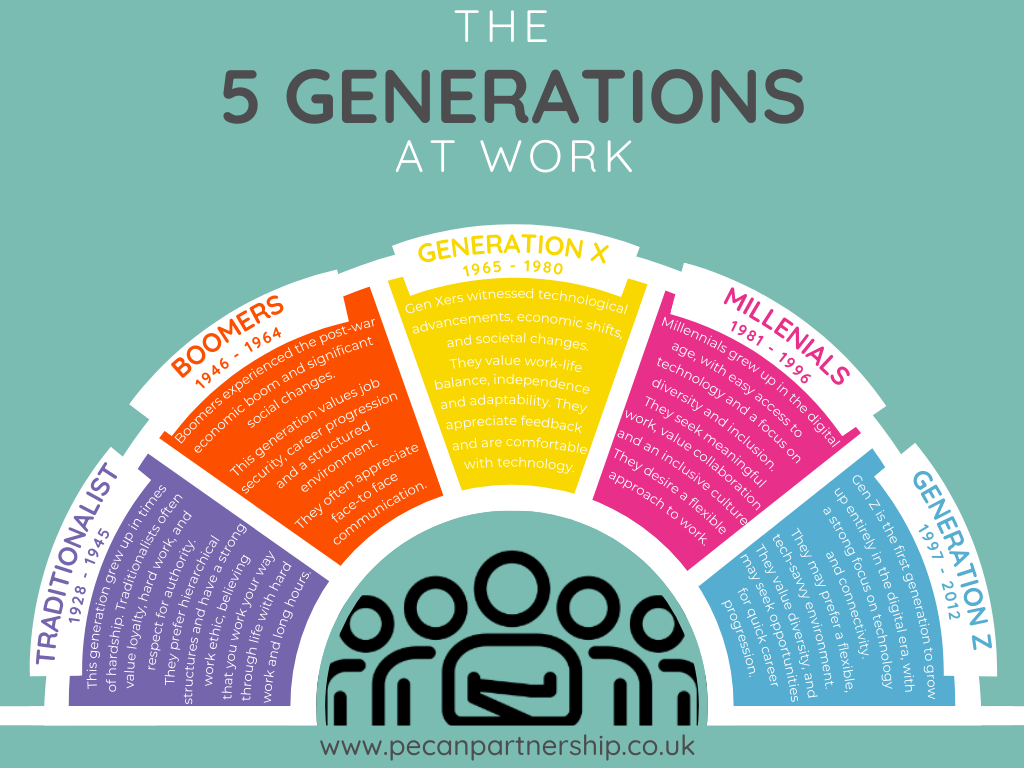[ad_1]
“They’re actually annoying, particularly within the office. They’re like, ‘Nah, I’m not feeling it immediately, I’m gonna are available in at 10:30 am.’”
This quote from Jodie Foster’s interview in The Guardian received a number of media consideration, maybe as a result of it chimed with the unstated emotions of older generations and their perception that younger folks immediately are ultimately ‘work-shy’.
It’s human nature to place issues (or folks) in packing containers with labels – categorisation helps us make sense of data rapidly and effectively.
So listed below are some neat packing containers to start out with

However issues begin when that is so far as we go – we cease on the labels, utilizing them to substantiate beliefs we already maintain about completely different generations and reinforce the stereotypes getting in the way in which of progress.
We now have in all probability all heard the narrative that the following technology is “entitled” or “snowflakes”, and that they refuse to work lengthy hours or go together with organisational change with out difficult the reasoning behind it.
I’m a Gen X mother or father to Gen Z younger folks and I work with tons of of shoppers throughout all generations. For each individual I can consider who conforms to those labels, I can consider ten who don’t.
Rather more so, I see the big untapped potential to share studying and experiences throughout generations that can be utilized to resolve issues, deliver contemporary considering and meet buyer wants that can’t be completed alone.
valuing particular person expression over conforming to social stereotypes, guided by intrinsic values and social accountability reasonably than materials features
Take Gen Z (or 2020) for instance. McKinsey’s True Gen report describes how they’re usually extra pragmatic and analytical about choices than members of earlier generations and imagine that dialogue is required to create change.
Elsewhere in Jodie Foster’s interview, it’s obvious that she too appreciates qualities in youthful actors which are impressively progressive – valuing particular person expression over conforming to social stereotypes, guided by intrinsic values and social accountability reasonably than materials features.
So how will we break via the stereotypes and faucet into the wealth of variety that folks of all generations can deliver to our workplaces?
How one can assist multi-generations work brilliantly collectively
1. Drop the stereotypes
As an alternative get to know people as ‘entire people’ – their strengths, their challenges, their aspirations. Folks leaders must prioritise constructing sturdy, insightful relationships in order that they’ll personalise their method to administration. Understanding somebody just isn’t the identical as colluding with them. The truth is, it could actually make it simpler to stretch and problem folks to have an excellent larger influence.
2. Strengthen emotional intelligence (EQ)
If EQ isn’t already talked about and developed in your organisation, now’s the time. This takes reflection to create protected areas on a routine foundation to lift consciousness of non-public values, beliefs, assumptions, motivations and the influence of behaviour. Ensure that leaders role-model, elevating their self-awareness in addition to understanding others.
3. Emotional schooling
Understandably the Pandemic precipitated us all to focus intently on our bodily and psychological well being with managers ensuring folks had been protected. However we might now be overly delicate to ‘unfavorable’ feelings and use language that perpetuates emotions that we don’t need. (My son lately rang to inform me he’d had an “nervousness assault” on a faculty journey – after we talked some extra he realised he had merely felt nervous”).
Experiencing a full vary of feelings and a wholesome degree of adrenalin is a part of being a completely functioning, wholesome grownup. Assist folks identify their feelings precisely and de-dramatise their language to allow them to settle for their emotions and develop coping methods that preserve them studying and rising.
4. Set ‘stretch targets’ collectively
In my expertise, lots of the fundamentals of fine administration have fallen by the wayside – setting SMART targets, and having common 121 conversations. Working with a number of generations might make this really feel tougher as a result of expectations and motivators could also be completely different from our personal, however hybrid working makes these primary routines extra essential than ever.
5. Goldilocks folks insurance policies and practices
Make it possible for HR insurance policies and practices aren’t too harsh and never too mushy, enabling managers to take an method that balances compassion and problem. They should know that they are going to be supported if they’re working with a member of their crew to enhance their efficiency in an applicable method, while not imposing guidelines that simply don’t work for the wide selection of circumstances during which individuals are residing and dealing.
Significant work enhances our shallowness
Gallup’s State of the International Workforce report discovered that 70% of crew engagement is attributable to the supervisor, they’re the linchpin of engagement. However budgets are usually aimed toward senior leaders, lacking the chance to develop basic expertise in anybody main folks within the organisation.
Significant work enhances our shallowness and boosts wellbeing which in flip helps us be productive. Serving to every individual in a crew unlock this expertise, no matter their technology, is the results of nice folks administration.
Change comes from dialogue and good dialogue requires confidence and ability. So to assist multi-generations work brilliantly collectively and faucet into the potential that this elixir of experiences brings into workplaces, put money into your managers and create areas for curiosity and collective motion.
on this subject? Learn Saying ‘no’ drives a tradition of excessive efficiency and empowerment
[ad_2]

